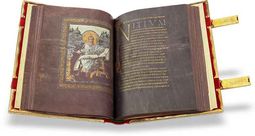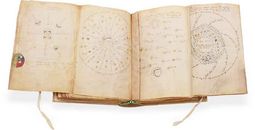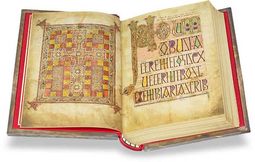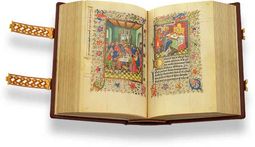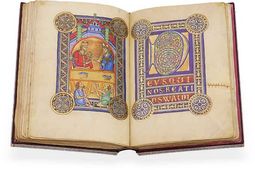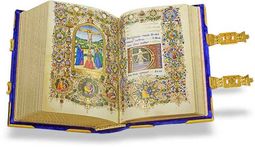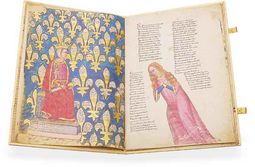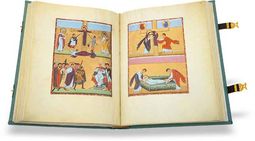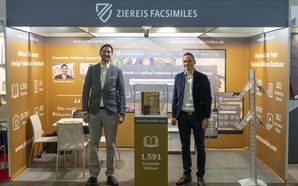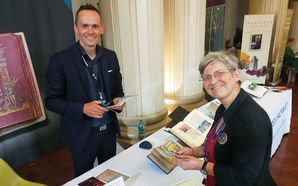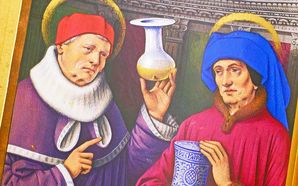Years of Facsimile Expertise and Internationally Sought-After Facsimile Experts: Christian and Georg Ziereis
More than 1,500 facsimile editions from more than 65 publishers worldwide – books of hours, Gospel books, Bibles, atlases, chronicles – Romanesque, Gothic, Renaissance – partial and full facsimiles, trimmed edges and leather bindings, special and normal editions – advance payment, subscription, antiquarian editions...you can quickly lose track here!
To find your way around, you need independent experts in the field who will answer all your questions and guide you through the incredibly beautiful but sometimes confusing world of facsimiles. We have put together this overview of our expertise so that you can get an impression of us. It is only a small part of our work of course, since we cannot list all of our experiences here, but it should give you a good overview of who we are and what distinguishes us.
International Lectures: International Medieval Congress (University Of Leeds)










At the International Medieval Congress in Leeds, more than 3,000 scholars from all over the world meet each year to exchange ideas in round table discussions with colleagues from all fields of medieval studies. The central component of the largest medieval congress in Europe is, however, hundreds of lectures, so-called sessions, in which scholars present their latest findings and report on their research on four packed days.
Last year, Dr. Siegrid Schmidt from the University of Salzburg invited us to organize a workshop on facsimiles. Mag. Sonja Führer, director of the monastic library of St. Peter's Abbey, gave her insights into the use of facsimiles in the academic world before I myself spoke about the lengthy manufacturing process.
In our 45-minute lecture "The Manufacture of a Medieval Manuscript Facsimile" we dealt with the many challenges that have to be faced in producing the facsimile of a medieval manuscript: the selection and access to the original manuscript, digitization and paper selection, the processes preparing of the print data and the actual printing itself, the gilding and trimming, and finally the labor of bookbinding. Even experts in medieval manuscripts are often not aware of how complex, difficult and lengthy the process of creating a modern facsimile.
However, sometimes it happens quite spontaneously that our expertise is in demand. During a customer visit to Rutgers University in New Jersey, for example, we were asked by a course instructor whether we were not ready to give his students (Art History) a spontaneous 25-minute lecture on medieval manuscripts. No problem!


National Lectures: Before Clubs and School Classes



Of course, we not only give lectures abroad, but also at home. Medieval book illumination is such an interesting topic that the inquiries and the associated audience are as colorful as some masterly miniatures. They do not always have to be specialist congresses: service clubs such as Rotary International or the Lions Club, lectures accompanying exhibitions or special events, or invitations to home associations belong to this spectrum. However, we have a lot of fun when school classes visit us in Regensburg or when we go to school ourselves to introduce young people to the art of the Middle Ages. Then, in the most exciting way possible, we talk about bile ink, lapis lazuli, and parchment, the difficulties that a medieval monastery or a miniaturist faced, and trace the long journey from the idea to the splendid finished codex.





Ziereis Facsimiles and Strong Partners


When you have specialized in facsimiles for almost two decades, you will of course collect a large number of friends, partners, and valued customers. These include facsimile publishers, printers, bookbinders, curators, restorers, and manuscript specialists as well as universities, libraries, and private collectors.
We are also particularly proud of our trusting cooperation with the highest state, federal, and ministerial authorities of the Federal Republic of Germany, such as the Foreign Office in Berlin.





Represented at Trade Shows and Conferences at Home and Abroad




Of course, we are also represented as participants and exhibitors at trade fairs and conferences in Germany and abroad. Examples include specialist congresses like the annual Art Libraries Society North America Conference (ARLIS) or the International Medieval Congress at the University of Leeds (IMC), and of course the international book fairs in Frankfurt and Leipzig. If you cannot come to Regensburg, visit us there at our booth, we look forward to seeing you!















And in Museums and Libraries around the World



Since the splendid medieval manuscripts with which we deal are kept almost exclusively in museums and libraries, it goes without saying that we also travel there to experience these often unique art treasures. We are happy to accept invitations from friends and partners, make a "small detour" when we are nearby, or visit very interesting exhibitions.











Comparison with the Original


Whenever possible, we naturally compare our facsimiles with the original manuscripts. Unfortunately, these are rarely shown in exhibitions. However, one can always find an opportunity here and there, especially since we are happy to be given the opportunity to make such a comparison.




